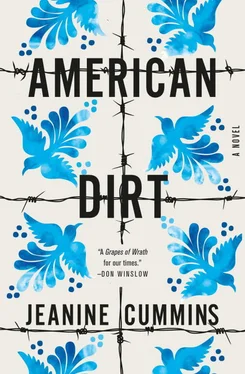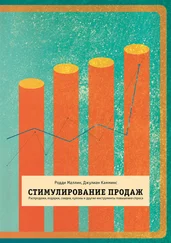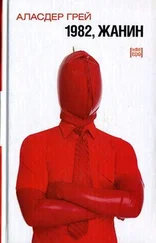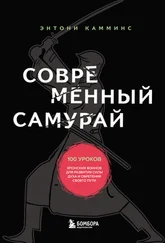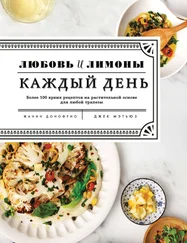Lydia tilted her head to one side, placed her hand against her forehead. ‘I don’t know what to do,’ she whispered. ‘It seems impossible.’
‘There’s nothing to do, Lydia.’
‘But I just can’t understand it. I know him.’
‘I know, Lydia, I know. How charming he can be, how erudite. But he’s also incredibly dangerous.’
She pictured Javier’s eyes, how exposed they looked whenever he removed his glasses. That word dangerous seemed so incompatible.
‘I know it’s difficult to get your head around it,’ Sebastián said. ‘I can see you’re struggling, and I’m sorry.’ He paused before he shifted gears. ‘But he’s a murderer, Lydia. Many times over. This guy is made of blood.’
This guy. She shook her head again. Sebastián stood up and placed his hands on the back of his chair. He pushed it under the table. ‘He’s not who you thought he was.’
‘But you said yourself, just last night, that he, that Los Jardineros, they aren’t as violent as the other cartels.’
He had said that, dammit. Lydia opened the kitchen window to the noise of traffic below.
‘Lydia, I love you. I love your loyalty and your goodness. But we are talking degrees of murderers here. Less violent or not, he’s still a major narco. And when you’ve killed that many people, killing becomes conventional. Does it matter that he’s killed fewer children than other murderers have? It’s not a moderation born of virtue. It’s a pinche business decision. That guy would kill anyone if he thought it was the smart thing to do.’
‘Not anyone.’ Her voice was a weakening plea. ‘He has a daughter.’
Sebastián dropped his head between his outstretched arms.
‘Sebastián, listen,’ she said. ‘I know it all sounds absurd but I’m not naïve. I’m not an idiot, right?’
‘You’re the smartest woman I know.’
‘So I’m just, I’m trying to take it all in, to reconcile everything you’re telling me, and to make it match up with the person I know Javier to be.’
‘I know, I know.’
‘It’s difficult.’
‘I can’t imagine.’
‘Because I do, Sebastián, I know him. And like you say, he is smart. In a different life he could’ve been someone good—’
‘But it’s not a different life, Lydia. He’s not someone good.’
‘But maybe he still could be. That’s what I’m telling you. Because people are complex and whatever you say he is, he’s also this other person. This tortured, poetic soul, full of remorse. He’s funny. He’s kind. Maybe things could still be different.’
‘Wait.’ Sebastian surveyed his wife, who was now leaning against the kitchen windowsill. Outside a horn blared, and a breeze moved past a drying tendril of her hair. ‘Wait a second, Lydia. Are you in love with him?’
‘What?’
‘Are you?’
‘Sebastián, don’t be ridiculous. This is no time for histrionics.’
He shook his head. ‘But do you have feelings for him?’
‘No, not like that. I do love him—’
‘You love him?’
‘He’s my friend! A real friend, someone who’s become very important to me!’ She leaned her hands on her knees and looked up at him. The coffeemaker gurgled and sighed. ‘His father died of cancer, too.’
Her husband pulled the chair back out and sat down again. ‘Oh, Lydia.’
Sebastián had never met Lydia’s father, but his death was such a defining loss in Lydia’s life, and indeed in Sebastián and Lydia’s early courtship, that he felt a strong kinship to his deceased father-in-law, nonetheless. He knew all the stories. How, when Lydia was twelve years old (slightly too old for teddy bears), her lifelong favorite developed a gash in its nose. Lydia was heartbroken and embarrassed. The bear hemorrhaged his stuffing all over the house. Lydia’s father went quietly to the pharmacy and returned with a bag that he placed on their kitchen table beneath a swing-arm lamp. He instructed her to bring the bear from her room. She transported the bear with great care, and when she returned to the kitchen, it had been transformed into an operating room. There was a sheet of plastic spread out across the table. Her father wore a mask and rubber gloves. His surgical tools were spread out beneath the lamp: needle, thread, a gleaming swatch of new leather. Lydia’s father crafted an entirely new leather nose for her bear. Sebastián knew, too, that the only green vegetable his father-in-law ate was lima beans, that he had a three-inch scar on his leg from a childhood boating accident, that he sang loudly at concerts and sometimes in mortifying harmony with whatever act was onstage. Sebastián knew that the only time Lydia had ever seen her father cry was when Oscar De La Hoya won the gold medal round at the 1992 Olympics in Barcelona. Sebastián felt such a fondness for his father-in-law that he wondered if he knew the man better in death than he would have in life. They’d been dating only eight weeks, and were at the Estadio Azul in Mexico City attending a fútbol match when Lydia got that terrible phone call. Though the cancer had been slow, the end had been fast, unexpected. It was October 24, 2003, exactly one week before el Día de los Muertos . Reportedly his last words had been, ‘There’s a party. I have to prepare.’
Lydia and Sebastián left the stadium immediately, and he drove her first to her apartment and then, through the night, back to Acapulco. Her clothes were in heaps in the backseat. She couldn’t think what she was supposed to bring, so she brought everything. She packed in a laundry basket. Sebastián held her hand in the dark and stopped on the side of the road near Cuernavaca when she thought she might throw up. He drove back and forth to Mexico City three more times that week: the next day, to retrieve his own clothes, two days later, to inform Lydia’s professors and his own about their absences, and finally to bring some of her friends down for the funeral, and to join Lydia’s mother in convincing Lydia to return to college.
In some way, Sebastián always credited that tragedy with being the thing that cemented their relationship. They had already known they were falling in love, and then the gravity of that heartbreak acted like a measuring stick for Lydia. It calculated the depth of Sebastián’s character. The death aroused an unfamiliar stability in Sebastián. He found himself expanding in an effort to plug the holes in Lydia’s life. So he understood, when she said this simple thing about Javier – that his father died of cancer, too – Sebastián understood the scope of what that shared experience really meant to his wife.
‘How old was he,’ Sebastián asked, ‘when his father died?’
‘Eleven,’ she said.
Sebastián grimaced. ‘Terrible.’
Lydia went to the cupboard and took down two mugs, which she filled with coffee. She set one in front of her husband and sat down beside him once again. She drew her knees up and wrapped her arms around her legs.
‘Sebastián, I think he’s in love with me.’
Sebastián filled his cheeks with air before letting it all loose into the room. ‘ Maldita sea, ’ he said. ‘Of course he is.’
* * *
In the short term, the only real change was that Sebastián began calling and coming to the shop more frequently than he had before. Four or five times a day he texted, and even if she was busy, she made sure to respond, to reassure him. All was well. Lydia was intensely nervous when Javier came the following week. She texted Sebastián beneath the counter. He’s here. I’ll call u after.
Javier carried a small parcel and his eyes were brighter than usual. He seemed eager for the other customers to withdraw, but Lydia took her time, reluctant to be alone with him. When the last couple wandered toward the exit without any purchases, she called after them, ‘Did you find everything okay?’ They didn’t answer her. The man only nodded, and the bell above the door startled as they left. Lydia’s hands trembled as she spooned sugar into Javier’s cup.
Читать дальше
